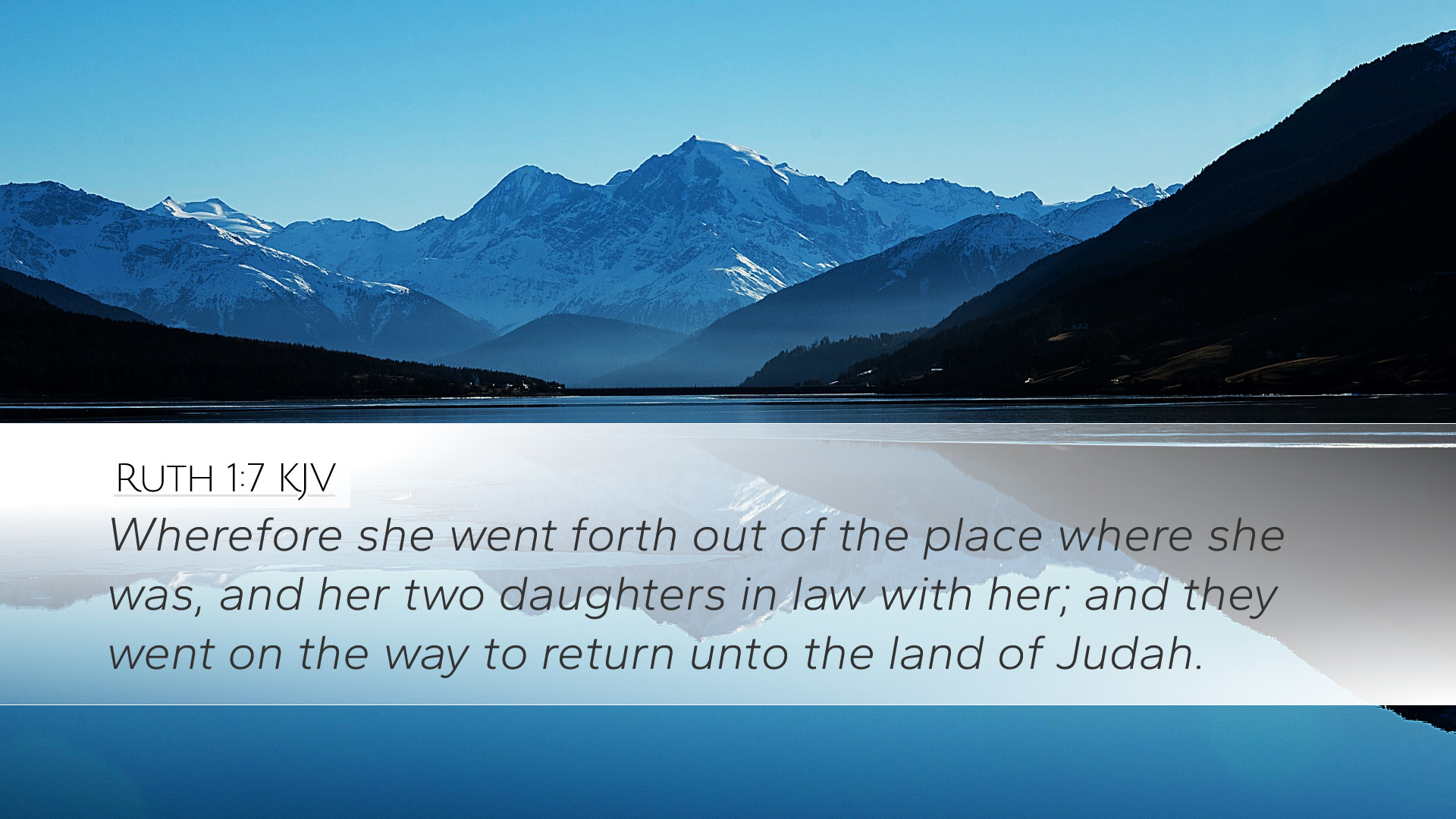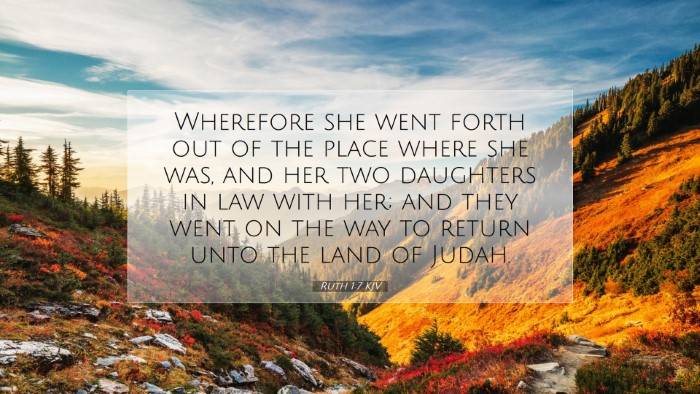Old Testament
Genesis Exodus Leviticus Numbers Deuteronomy Joshua Judges Ruth 1 Samuel 2 Samuel 1 Kings 2 Kings 1 Chronicles 2 Chronicles Ezra Nehemiah Esther Job Psalms Proverbs Ecclesiastes Song of Solomon Isaiah Jeremiah Lamentations Ezekiel Daniel Hosea Joel Amos Obadiah Jonah Micah Nahum Habakkuk Zephaniah Haggai Zechariah MalachiRuth 1:7
Ruth 1:7 KJV
Wherefore she went forth out of the place where she was, and her two daughters in law with her; and they went on the way to return unto the land of Judah.
Ruth 1:7 Bible Commentary
Commentary on Ruth 1:7
Ruth 1:7 states: “Wherefore she went forth out of the place where she was, and her two daughters in law with her; and they went on the way to return unto the land of Judah.” This passage marks a pivotal moment in the narrative of Ruth, illuminating themes of loyalty, transition, and divine providence.
Context and Setting
To fully appreciate Ruth 1:7, one must consider the historical and narrative context. The Book of Ruth takes place during the time of the judges in Israel, a period characterized by moral ambiguity and social upheaval. The verse describes Naomi's decision to leave Moab—a land associated with estrangement from Israel and the Lord—to return to her homeland, Judah.
Naomi's Journey
Naomi's journey signifies more than a mere geographical shift; it represents a spiritual and emotional return to her roots. Matthew Henry remarks that “her first step was a good one; she resolves to return to her own people, and to the worship of the true God.” This introspection reflects Naomi's recognition of her spiritual need amidst her personal tragedies.
The Role of Ruth and Orpah
The two daughters-in-law—Ruth and Orpah—accompany Naomi on this journey, exemplifying their allegiance. However, their motives and future decisions reveal contrasting paths. Albert Barnes notes that “their participation in Naomi’s journey signifies both loyalty to her and the potential longing for a new beginning.” The differing responses of Ruth and Orpah provide a foreground for exploring themes of commitment and divine purpose.
Ruth's decision later to stay with Naomi reflects a profound commitment that transcends familial obligation, as evidenced in Ruth 1:16 when she declares, “Whither thou goest, I will go.” Adam Clarke highlights the depth of Ruth’s loyalty, suggesting that “her love for Naomi was a reflection of her faith, and an anchor in the tumult of her circumstances.”
Divine Providence
This passage also serves as a backdrop for highlighting God’s providential hand in seemingly ordinary events. Throughout the book, God’s sovereignty is at work, orchestrating the lives of Naomi and Ruth. As Naomi embarks on her journey, it symbolizes a pivotal return to faith, suggesting that divine guidance often emerges from our greatest uncertainties. Both the physical return and the implied spiritual renewal speak to the unfolding narrative of God’s redeeming purposes.
Lessons for Today
For pastors, theologians, and students of Scripture, Ruth 1:7 serves as a rich text for reflection on several key themes:
- Returning to Faith: The call to turn back to God is central in the life of Naomi and serves as a reminder of the importance of spiritual renewal.
- Commitment amidst Change: Ruth's loyalty exemplifies the beauty of steadfast dedication in times of transition and uncertainty.
- Understanding Providence: The narrative invites us to perceive God’s guiding hand in our lives, especially when navigating difficult decisions.
- The Value of Relationships: The bond between Naomi, Ruth, and Orpah highlights the importance of supportive relationships in our spiritual journeys.
Conclusion
Ruth 1:7 opens a profound exploration of the journey back to faith, the trials of personal loss, and the unwavering hand of divine providence. As both a historical account and a spiritual parable, it invites readers to reflect on their own journeys and commitments. Through careful study and prayerful contemplation, we can discover the richness of God's Word and the depth of His plans for our lives, just as Naomi and Ruth did in their journey back to Judah.


